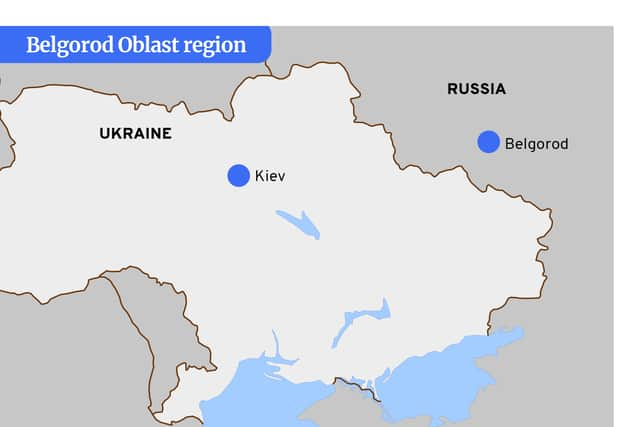Who are the Russian Volunteer Corps? Why did they attack Russia for Ukraine in Belgorod
and live on Freeview channel 276
Two anti-Putin paramilitary groups made up of Russians living in Ukraine have claimed responsibility for a raid in the Russian territory of Belgorod.
The Russian Volunteer Corps and the Freedom of Russia Legion say they undertook the cross-border raid, which saw towns and villages in the region targeted in an attempt to create a demilitarised neutral zone between Ukraine and Russia. The Kremlin has accused the two groups of being backed by the Ukrainian military, a claim disputed by Kyiv.
Advertisement
Hide AdAdvertisement
Hide AdWhile the raids were unsuccessful in creating a demilitarised zone, it is believed that the attacks exposed weaknesses in Russian defences. The Kremlin said that it was able to fight back against the incursion but drone attacks and paramilitary troops on the ground did damage to infrastructure and homes.
Russia launched a range of counter-terrorism measures in wake of the raids with Defence Minister Sergei Shoigu promising a "harsh response" to any further attacks on its territory.
Who are the Russian Volunteer Corps?
The Russian Volunteer Corps (RDK) is a paramilitary group of Russian origin which was created after the invasion of Ukraine in February 2022. The group formed in August 2022 to fight against Putin’s forces.
Upon its creation, the group posted on social media platform Telegram about its aims. The statement read: "We Russian volunteers living in Ukraine have decided to take up arms and create a military formation – the Russian Volunteer Corps – so that, together with our Ukrainian comrades-in-arms, we can defend their homeland, which shelters us, and then continue the fight against Putin's criminal regime.”


Advertisement
Hide AdAdvertisement
Hide AdThe RDK was founded by Denis Kapustin, also known as Denis Nikitin. Kapustin has said that he fights for Russia to belong to ethnic Russians and opposes Russia's imperialistic invasion of Ukraine.
The US-based Anti-Defamation League described Kapustin as a "Russian neo-Nazi who lived in Germany for many years". In reply to these claims, he said: "I have my set of views, it's a patriotic set of views, it's a traditionalist set of views, it's a right-wing set of views. You'll never find me waving a flag with a swastika, you'll never find me raising my hand in a Hitler sign, so why would you call me that?"
The group has said that it is part of Ukraine’s forces. However this has been disputed by the Ukrainian military which has said that the RDK is acting independently.
The group gained prominence in the conflict after the raid on the cross-border region of Bryansk in March 2023. The raid, which saw reports of conflicting information around hostages and casualties, concluded after the RDK said that it had taken no hostages and retreated back into Ukraine.
What happened in Belgorod?


Advertisement
Hide AdAdvertisement
Hide AdA cross-border raid of the Belgorod region began on 22 May 2023. It was reportedly orchestrated by the Russian Volunteer Corps and the Freedom of Russia Legion, a similar paramilitary group made up of volunteers of Russian emigrants to Ukraine and Russian military defectors.
Russian Telegram accounts recorded what appeared to be raids at the border checkpoint in the Grayvoronsky district of the Belgorod Oblast. There were also reports of drone attacks and explosions in the district.
The two paramilitary groups quickly claimed responsibility for the raid. They said that they had been working together to control the villages of Kozinka, Gora-Podal and Glotovo to create a demilitarised zone between Russia and Ukraine.
Fighting in the region lasted two days. Russian military officials said that it had killed more than 70 members of RDK and Freedom of Russia Legion, with others once again retreating into Ukrainian territory.
Advertisement
Hide AdAdvertisement
Hide AdRDK leader Kapustin has vowed that more incursions into Russia are planned for the future. The Kremlin labelled the paramilitary groups “saboteurs” backed by the Ukrainian military. However, Ukraine has denied any involvement with the raids, insisting that they were perpetrated by Russian nationals.
Comment Guidelines
National World encourages reader discussion on our stories. User feedback, insights and back-and-forth exchanges add a rich layer of context to reporting. Please review our Community Guidelines before commenting.
